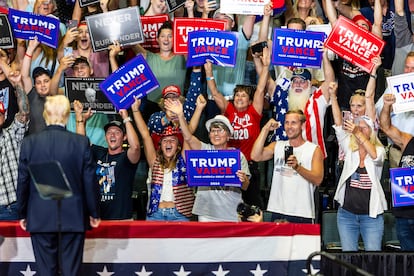Kamala Harris must challenge Trump’s overtures to American workers
Democrats must convince voters that they — not Republicans — are the true party of the American working class

July 2024 will go down in history as one of the most momentous months in American politics. Between the attempted assassination of Donald Trump, U.S. President Joe Biden’s withdrawal from the presidential race, and the rise of Vice President Kamala Harris as the Democratic Party’s presumptive nominee, it is hard to keep up with the frantic pace of political events. While some may look to the past for guidance or reassurance, it is unclear if any historical comparison can truly match the sheer drama of recent weeks.
Since it became clear that Trump would once again be the Republican Party’s nominee, Democrats have framed the election as an existential battle between democracy and authoritarianism. Biden is portrayed as a Winston Churchill-like leader who will not only protect democratic institutions and values in the United States, but also defend Europe’s freedom, by supporting Ukraine. By contrast, Trump is often depicted as “America’s Hitler” — as his own running mate, Senator J.D. Vance, once called him — bent on turning the country into an autocratic dystopia. This was the Biden campaign’s narrative, and if her early remarks are any indication, it will also be Harris’s.
Not surprisingly, Republicans see things differently. In a private conversation, one adviser to the Trump-Vance campaign used an unexpected historical analogy. Instead of comparing the U.S. to the United Kingdom during World War II, he drew parallels with postwar Britain, which was, in his view, victorious but overburdened. In WWII’s aftermath, the U.K.’s primary political battle was internal, with the U.K.’s Conservative Party, which stood for the elites and the British Empire, facing off against the worker-friendly Labour Party, which focused on winning the peace at home.
My interlocutor said that today’s Democrats remind him of the Conservatives, who represented the upper class, embodied the political establishment, and sought to maintain the trappings of a global empire during a period of retrenchment. Trump and Vance’s pro-worker agenda, he claimed, more closely mirrors that of the postwar Labour Party.
After WWII, the Labour Party held particular appeal for the working class, who felt that they had borne more than their fair share of the burden of WWII, suffered the consequences of internationalist foreign policies, and been generally “left behind.” Similarly, Trump and Vance claim to speak for “forgotten” Americans, and the key focus of their campaign is reinventing the Republican Party’s class base.
Trump and his supporters often point out that the Democratic Party is now the party of Wall Street, Hollywood, and Silicon Valley. Now, GOP advisers are seeking to rebrand “country-club Republicans” as “working-class Republicans.” When Vance said he hoped to celebrate his mother’s 10 years of sobriety in the White House, he was speaking to a very specific audience of working-class Americans struggling in places “blown out by globalization,” as one Republican strategist put it to me.
Moreover, just as the postwar British left railed against the pernicious influence of upper-class elites, Trump and Vance are targeting the Washington establishment. In his iconic 1941 essay The Lion and the Unicorn, George Orwell — a fervent Labour supporter — called for replacing the U.K.’s out-of-touch mandarinate. The MAGA movement is similarly suspicious of the national-security establishment, military leadership, and Big Business, all of which today’s Republicans associate with the Democratic Party. As part of its Project 2025 agenda, the Heritage Foundation advocates firing the 50,000 federal civil servants who comprise the administrative state and replacing them with a new leadership class — a step Vance has enthusiastically endorsed.
But for my interlocutor, the most relevant parallel between today’s U.S. Republican Party and the postwar U.K. Labour Party lies in their stances on their respective countries’ global role. After WWII, Britain faced the choice either to maintain its empire or — as Labour advocated — to focus on improving welfare at home. According to Trump’s strategists, the U.S. now faces a similar choice.
At his rallies, Trump often criticizes what he views as U.S. strategic overreach, noting that, as president, he did not start a major war or initiate any foreign interventions. Electing him, he argues, would bring both greater peace and a renewed focus on domestic prosperity. Vance’s vision — which focuses on raising the minimum wage, expanding social protections, and bolstering corporate regulation — has a quasi-social-democratic quality.
To be sure, my Democratic friends — much like most reputable historians of postwar Britain — will see the comparison to Labour as absurd. After all, Trump’s first term focused more on courting plutocrats and cutting taxes for the rich than on building a welfare state. The Biden administration, for its part, has done a lot to help left-behind voters, especially through major policy initiatives like the Inflation Reduction Act. But, if the Trump-Vance campaign gets its way, voters will not recognize that.
In the lead-up to November’s presidential election, Democrats will undoubtedly attack Trump and Vance for their extreme views on abortion, the U.S. Constitution, and Ukraine — views that do not align with mainstream public opinion. But they must also work to dismantle the narrative that Trump and Vance are champions of the working class.
In a sense, postwar Britain does carry an important lesson for Democrats today. Churchill was widely expected to win the 1945 general election, but the majority of British voters ultimately embraced the Labour Party’s agenda of trading imperial glory for rebuilding the domestic economy. Trump, Vance, and their strategists hope that their promise to Make America Great Again will resonate in a similar way.
Consequently, Harris will need to devote as much effort to countering Republicans’ cultural and policy-based appeals to workers as she does to addressing the threats to reproductive rights and the Constitution. To defeat Trump in November, Democrats must convince voters that they are the true party of the American working class.
Sign up for our weekly newsletter to get more English-language news coverage from EL PAÍS USA Edition
Tu suscripción se está usando en otro dispositivo
¿Quieres añadir otro usuario a tu suscripción?
Si continúas leyendo en este dispositivo, no se podrá leer en el otro.
FlechaTu suscripción se está usando en otro dispositivo y solo puedes acceder a EL PAÍS desde un dispositivo a la vez.
Si quieres compartir tu cuenta, cambia tu suscripción a la modalidad Premium, así podrás añadir otro usuario. Cada uno accederá con su propia cuenta de email, lo que os permitirá personalizar vuestra experiencia en EL PAÍS.
¿Tienes una suscripción de empresa? Accede aquí para contratar más cuentas.
En el caso de no saber quién está usando tu cuenta, te recomendamos cambiar tu contraseña aquí.
Si decides continuar compartiendo tu cuenta, este mensaje se mostrará en tu dispositivo y en el de la otra persona que está usando tu cuenta de forma indefinida, afectando a tu experiencia de lectura. Puedes consultar aquí los términos y condiciones de la suscripción digital.









































